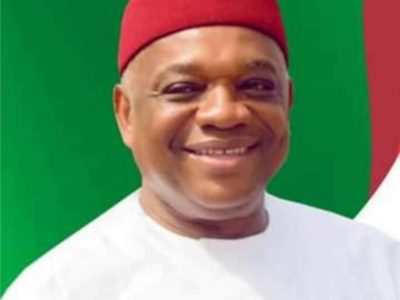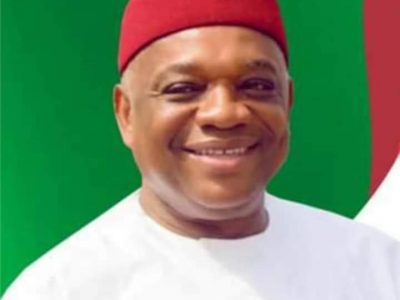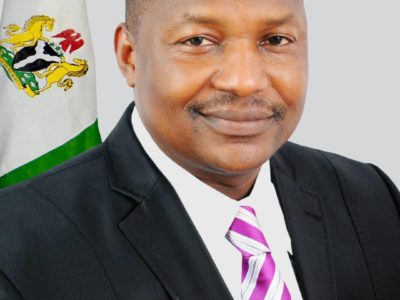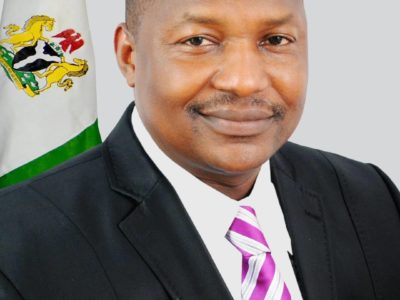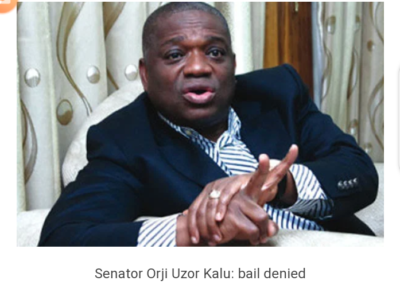Orji Uzo Kalu @62
Happy birthday to Senator Orji Uzor Kalu, the most suitable next president of Nigeria — By Emeka Ugwuonye I chose the occasion... Read More
Orji Uzo Kalu @62
Happy birthday to Senator Orji Uzor Kalu, the most suitable next president of Nigeria — By Emeka Ugwuonye I chose the occasion... Read More
Nigeria ministry of justice publishes its proposed changes in the administration of justice.
The proposed changes published in a press release by the Attorney General of the Federation is a welcome development, just as an effort. But it shows a Ministry of Justice that is far behind in conceptualization and terribly unrealistic in its plans for implementation.
The ministry does not understand or it fails to acknowledge the principal cause of the problem it seeks to cure, which is basically corruption.. Trying to speed up the trial of charges motivated by corruption is like trying to increase the speed of an athlete who is running on a wrong track. Increased speed will not cure the fundamental defect.
It Also failed to understand the effect of corruption in the judiciary.
The reforms proposed are more likely to be exploited by corrupt police, corrupt judges and court officials. For instance, virtual trials will make it harder for a judge to observe torture injuries inflicted by the police.
Also, not looking into corruption and inefficiencies in the way judges are appointed means that more incompetent and corrupt judges will be appointed.
Furthermore, the proposed reform failed to consider how cases are prosecuted in Nigeria. With the power to arrest, investigate, indict and prosecute all vested in the undifferentiated police department, what you have and which you want to continue is a debilitating mechanism for corruption and injustice.
Finally, the Attorney General's press release is totally silent on how the changes will be funded. With oil prices falling below the production cost, it is more likely that the Government will be firing workers soon, rather than appointing more.
There is no doubt that the ministry of justice is desperately trying to catch up. These reforms were long overdue and often meaningless. You don't need any changes in the law to ensure that a criminal charge should be struck out for want of diligent prosecution if the prosecutor fails to appear. The law has been there. What you need to do is to seek ways to protect the judges who out of fear of consequences fail to apply the law in favor of the accused. The reforms proposed are reforms that ought to have occurred before Covid-19, not after. From every indication, this proposed reform looks more like something that was written four years ago, which the Attorney General failed to pursue then.
PRESS RELEASE
Malami Rolls Out Plans for Post COVID-19 Justice System
The damaging effects of the sudden outbreak of COVID-19 pandemic impact upon all the ramifications of human life. The Nigerian Justice Sector is obviously not immune from the effects of the pandemic. The necessity to prevent the spread of COVID-19 virus has led to, among other things, a nationwide closure of court rooms (save for certain exceptions). Hence, the urgent need for paradigm shift to adjust the judicial process to make for recovery of lost grounds occasioned by the lockdown.
Considering the current realities and in adjusting to the times, therefore, we will work with the Judiciary at the Federal and the State levels to arrive at a workable mechanism for achieving these within the shortest time possible.
We will continue with the on-going implementation of the National Policy of Justice with renewed vigour, while making necessary adjustments as may be required due to the COVID-19 disruptions. Application of technology is not strange to our Justice Sector/Judicial System. The Judiciary adopted a Judiciary Information Technology Policy in 2012 to guide the use of ICT by the Judiciary. In this wise, the Supreme Court introduced electronic filing and this has also been adopted by some States’ High Courts. One major lesson from COVID-19 is that the Nigerian Justice Sector must seriously leverage technology in the improvement of its capacity and for facilitating fair and speedy administration of justice.
Information technology is the tool we are majorly going to use to cover the lost ground in our judicial system and measures are already on going to address this in our judicial system. These adjustments will cover, the Courts’ Administrative Processes (such as filing of Court Processes), Regulation of Access to Court and even sitting arrangements during proceedings (to sustain the gains we must have recorded in trumping COVID-19), tracking and retrieval of information from the courts, scheduling of court proceedings with strict time-allocation.
Robust use of technological tools to conduct proceedings including virtual proceedings, (this would also enable the Justices/Judges to preside over matters in their chamber without being physically present in a formal court room, parties and their counsel will only connect through teleconference means) etc. Some of these adjustments are not simple and may require certain amendments of the Law (or Issuance of Rules of Court and Practice Directions) as may be necessary. The judges will be sitting and maintaining social distance while the lawyers’ interface with the courts through their digital computers should be considered in certain cases.
We expect the judiciary to keep supporting the Presidential Task Force on COVID -19 and consider how best to start opening up as soon as possible and to start tackling backlog of cases. We will start by seeing how much cases can be handled online or without a face-to-face interaction leveraging on the use of technology.
As such the Office of the Attorney-General of the Federation and Minister of Justice, with support of relevant stakeholders, will see
to:
1. Empowering the institutions of the ACJA, 2015 to commence functioning immediately. For instance, Part 46 dealing with the administration of the Criminal Justice Monitoring Committee; Section 251- witness payment; sections 107 & 108 etc. The net result will galvanize the judicial sector into rapid mode to fast track trials and release of those who are deserving.
2. Deployment of ICT facilities to fast-track taking evidence from witnesses. Digital platforms such as Skype and Zoom can be used. NTA stations across the country can be connected to courts to facilitate taking evidence as witnesses do not have to necessary be physically present in court. It is expected that NTA facilities are to provide the rudimentary structures for video conferencing in view of their digital switchover process. Using their existing IT infrastructure, the courts may only need video screens and bandwidth at the minimum to ensure connectivity between parties to the proceedings.
3. Speedy processing of pending civil matters that have not reached advanced stages of hearing and with the consent of parties and their solicitors to opt for out of court settlement. This may even mean using multi-door mediation avenues in courts that already have one, such in the case of Lagos and the FCT and a few other states.
4. Criminal charges of minor and non-indictable offences should be summarily tried and sentenced to non-custody penalties. Even in cases where sentenced persons cannot pay their fines, the court should consider other alternative punishments other than jail term. This can include parole or probationary sentences and, if possible, community service like cleaning public places etc.
5. Persons awaiting trial on minor criminal charges should be discharged, especially in cases where adjournments have been at the instance of the prosecution.
6. The passing of the civil equivalent of the ACJA in order to fast track the disposal of civil proceedings. Civil matters are proportionately more in number and tend to clog the speedy completion of civil trials. The proposed law (civil equivalent of the ACJA) should stipulate time line for commencing and completing civil trials.
Front loading of evidence should also be adopted for civil trials in order to fast track hearings.
7. Setting aside special dates and that Courts work extra hours to decongest their case files. The 2020 court vacation could be suspended as the COVID 19 lockdown period has provided judges with the much-needed break from official duties.
8. Having courts that are fully IT-compliant in order to fast track the digital recording and production of the record of court proceedings. The courts should also be able to automate case filing and cause list management.
9. Appointment of more judges and justices, as appropriate. Additional judicial decisions of federal courts are to be created. This will, as a proactive measure, help in decongesting the already loaded court hearing schedules.
10. Payment of court fees is done electronically. All court fees should be done electronically and not in cash. The courts should only receive receipts of payments and this can be transmitted online as well.
At Courts where hearing electronically may not possible, we can also consider having only few people attend to court matters. Ensuring that court dockets have only few cases per day can reduce the number of persons in courts. So, all the pending judgments should be drafted and concluded during short period of time. This does not require lawyers to be present. Once the judgment is ready, the lawyers should be able to receive them in their email or it should be posted on the court’s website for any interested party to download it. This is the way to go and thus provide greater transparency.
The way to go in effect, Court Proceedings should also be handled in a manner that reduces the number of persons in the courts at any given time. Although this requires the movement of suspects from prisons to the courts, all such suspects should be tested, in fact everyone entering the court premises should be tested to ensure that they are not already positive, thus risking the lives of other people.
While some of these changes may not happen in the short term, there is need to start the introduction of these new initiatives immediately through consultations with the Judiciary, NBA, and other relevant stakeholders.
Signed
Abubakar Malami, SAN
Attorney-General of the Federation and Minister of Justice Federal Republic of Nigeria
(20th of April, 2020).
Nigeria ministry of justice publishes its proposed changes in the administration of justice.
The proposed changes published in a press release by the Attorney General of the Federation is a welcome development, just as an effort. But it shows a Ministry of Justice that is far behind in conceptualization and terribly unrealistic in its plans for implementation.
The ministry does not understand or it fails to acknowledge the principal cause of the problem it seeks to cure, which is basically corruption.. Trying to speed up the trial of charges motivated by corruption is like trying to increase the speed of an athlete who is running on a wrong track. Increased speed will not cure the fundamental defect.
It Also failed to understand the effect of corruption in the judiciary.
The reforms proposed are more likely to be exploited by corrupt police, corrupt judges and court officials. For instance, virtual trials will make it harder for a judge to observe torture injuries inflicted by the police.
Also, not looking into corruption and inefficiencies in the way judges are appointed means that more incompetent and corrupt judges will be appointed.
Furthermore, the proposed reform failed to consider how cases are prosecuted in Nigeria. With the power to arrest, investigate, indict and prosecute all vested in the undifferentiated police department, what you have and which you want to continue is a debilitating mechanism for corruption and injustice.
Finally, the Attorney General's press release is totally silent on how the changes will be funded. With oil prices falling below the production cost, it is more likely that the Government will be firing workers soon, rather than appointing more.
There is no doubt that the ministry of justice is desperately trying to catch up. These reforms were long overdue and often meaningless. You don't need any changes in the law to ensure that a criminal charge should be struck out for want of diligent prosecution if the prosecutor fails to appear. The law has been there. What you need to do is to seek ways to protect the judges who out of fear of consequences fail to apply the law in favor of the accused. The reforms proposed are reforms that ought to have occurred before Covid-19, not after. From every indication, this proposed reform looks more like something that was written four years ago, which the Attorney General failed to pursue then.
PRESS RELEASE
Malami Rolls Out Plans for Post COVID-19 Justice System
The damaging effects of the sudden outbreak of COVID-19 pandemic impact upon all the ramifications of human life. The Nigerian Justice Sector is obviously not immune from the effects of the pandemic. The necessity to prevent the spread of COVID-19 virus has led to, among other things, a nationwide closure of court rooms (save for certain exceptions). Hence, the urgent need for paradigm shift to adjust the judicial process to make for recovery of lost grounds occasioned by the lockdown.
Considering the current realities and in adjusting to the times, therefore, we will work with the Judiciary at the Federal and the State levels to arrive at a workable mechanism for achieving these within the shortest time possible.
We will continue with the on-going implementation of the National Policy of Justice with renewed vigour, while making necessary adjustments as may be required due to the COVID-19 disruptions. Application of technology is not strange to our Justice Sector/Judicial System. The Judiciary adopted a Judiciary Information Technology Policy in 2012 to guide the use of ICT by the Judiciary. In this wise, the Supreme Court introduced electronic filing and this has also been adopted by some States’ High Courts. One major lesson from COVID-19 is that the Nigerian Justice Sector must seriously leverage technology in the improvement of its capacity and for facilitating fair and speedy administration of justice.
Information technology is the tool we are majorly going to use to cover the lost ground in our judicial system and measures are already on going to address this in our judicial system. These adjustments will cover, the Courts’ Administrative Processes (such as filing of Court Processes), Regulation of Access to Court and even sitting arrangements during proceedings (to sustain the gains we must have recorded in trumping COVID-19), tracking and retrieval of information from the courts, scheduling of court proceedings with strict time-allocation.
Robust use of technological tools to conduct proceedings including virtual proceedings, (this would also enable the Justices/Judges to preside over matters in their chamber without being physically present in a formal court room, parties and their counsel will only connect through teleconference means) etc. Some of these adjustments are not simple and may require certain amendments of the Law (or Issuance of Rules of Court and Practice Directions) as may be necessary. The judges will be sitting and maintaining social distance while the lawyers’ interface with the courts through their digital computers should be considered in certain cases.
We expect the judiciary to keep supporting the Presidential Task Force on COVID -19 and consider how best to start opening up as soon as possible and to start tackling backlog of cases. We will start by seeing how much cases can be handled online or without a face-to-face interaction leveraging on the use of technology.
As such the Office of the Attorney-General of the Federation and Minister of Justice, with support of relevant stakeholders, will see
to:
1. Empowering the institutions of the ACJA, 2015 to commence functioning immediately. For instance, Part 46 dealing with the administration of the Criminal Justice Monitoring Committee; Section 251- witness payment; sections 107 & 108 etc. The net result will galvanize the judicial sector into rapid mode to fast track trials and release of those who are deserving.
2. Deployment of ICT facilities to fast-track taking evidence from witnesses. Digital platforms such as Skype and Zoom can be used. NTA stations across the country can be connected to courts to facilitate taking evidence as witnesses do not have to necessary be physically present in court. It is expected that NTA facilities are to provide the rudimentary structures for video conferencing in view of their digital switchover process. Using their existing IT infrastructure, the courts may only need video screens and bandwidth at the minimum to ensure connectivity between parties to the proceedings.
3. Speedy processing of pending civil matters that have not reached advanced stages of hearing and with the consent of parties and their solicitors to opt for out of court settlement. This may even mean using multi-door mediation avenues in courts that already have one, such in the case of Lagos and the FCT and a few other states.
4. Criminal charges of minor and non-indictable offences should be summarily tried and sentenced to non-custody penalties. Even in cases where sentenced persons cannot pay their fines, the court should consider other alternative punishments other than jail term. This can include parole or probationary sentences and, if possible, community service like cleaning public places etc.
5. Persons awaiting trial on minor criminal charges should be discharged, especially in cases where adjournments have been at the instance of the prosecution.
6. The passing of the civil equivalent of the ACJA in order to fast track the disposal of civil proceedings. Civil matters are proportionately more in number and tend to clog the speedy completion of civil trials. The proposed law (civil equivalent of the ACJA) should stipulate time line for commencing and completing civil trials.
Front loading of evidence should also be adopted for civil trials in order to fast track hearings.
7. Setting aside special dates and that Courts work extra hours to decongest their case files. The 2020 court vacation could be suspended as the COVID 19 lockdown period has provided judges with the much-needed break from official duties.
8. Having courts that are fully IT-compliant in order to fast track the digital recording and production of the record of court proceedings. The courts should also be able to automate case filing and cause list management.
9. Appointment of more judges and justices, as appropriate. Additional judicial decisions of federal courts are to be created. This will, as a proactive measure, help in decongesting the already loaded court hearing schedules.
10. Payment of court fees is done electronically. All court fees should be done electronically and not in cash. The courts should only receive receipts of payments and this can be transmitted online as well.
At Courts where hearing electronically may not possible, we can also consider having only few people attend to court matters. Ensuring that court dockets have only few cases per day can reduce the number of persons in courts. So, all the pending judgments should be drafted and concluded during short period of time. This does not require lawyers to be present. Once the judgment is ready, the lawyers should be able to receive them in their email or it should be posted on the court’s website for any interested party to download it. This is the way to go and thus provide greater transparency.
The way to go in effect, Court Proceedings should also be handled in a manner that reduces the number of persons in the courts at any given time. Although this requires the movement of suspects from prisons to the courts, all such suspects should be tested, in fact everyone entering the court premises should be tested to ensure that they are not already positive, thus risking the lives of other people.
While some of these changes may not happen in the short term, there is need to start the introduction of these new initiatives immediately through consultations with the Judiciary, NBA, and other relevant stakeholders.
Signed
Abubakar Malami, SAN
Attorney-General of the Federation and Minister of Justice Federal Republic of Nigeria
(20th of April, 2020).
Orji Uzor Kalu’s prison experience could transform the Nigeria’s criminal justice system
By Boniface Ocheje
Life is full of ironies, many unintended and unanticipated consequences - good and bad consequences alike. When on the 5th of December, 2019 the Federal High Court sitting in Lagos convicted Orji Uzor Kalu (OUK) for fraud, and sentenced him to 12 years in prison, many, including me, saw what happened just as another instance of the falling of the mighty, with the emphasis on the falling. But there has been some unintended consequence to it all.
OUK was moved to Ikoyi prison in Lagos the same day. Two days after, on the 7th of December, he was transfered to Kuje prison in Abuja.
In normal circumstances and for an ordinary person, one would expect OUK to be shocked and depressed by life in prison. But that was not what happened. Within days of his settling down in prison, OUK took notice of the conditions of the Nigerian prisons. As a premium inmate, OUK was largely immuned to the basic grind of prison life. But he was able to grasp the grinding conditions inmates and even the warders face on daily basis.
I got to know about OUK in prison through my elder brother, who was convicted of robbery that he did not commit. We believe that the judge was bribed to convict him. My brother's case has been on appeal. For two years, we have not been able to get a date for the appeal to progress. Two lawyers we hired have withdrawn as my family could not pay them. As a lecturer, I could not afford to pay in a timely fashion the amount of money the lawyers were calling. I visit my brother in Kuje Prison twice a month, until recently when they suspended visits due to the Coronavirus pandemic.
It was through my brother I first heard about OUK's activities in Kuje prison and I went to research more about his case and conviction. Before now all I knew about OUK was what I read in newspapers or things I heard people say about him, just as we generally hear about politicians and public figures. But when I went to visit my brother in January of this year, he told me about OUK. Apparently, they met in the church. Kuje Prison has a 1000-seated church run by a catholic priest as the Chaplain. My brother is a member of the church choir.
I understand that OUK is a good and devoted catholic and he worships regularly at the church. It was there he noticed my brother in the choir. OUK will routinely show interest in the cases of inmates he comes across. Upon hearing about my brother's situation, he sent for a new lawyer to take over my brother's appeal. The lawyer is a big lawyer, one of the best in Abuja. OUK paid the lawyer on the spot and within a week, the Court of Appeal fixed a date for the appeal to be heard. The hearing was only delayed by the lockdown.
I became interested in OUK and I began to ask more questions. I was totally shocked by what I discovered. My brother was not the only one to benefit from this man's large heart. OUK has embarked on changing the lives of inmates in Kuje prison - requesting the authority to improve feeding, water supply, electricity, paying for bail conditions, hiring lawyers for them, giving out money for medicine for the sick, paying the fines for many, giving money to those who completed their sentence so they could start life again. OUK is the benevolent revolution in prison.
I have not had the opportunity of meeting him one on one, even though I began to visit the prison more frequently hoping I might get an opportunity to thank him on behalf of our family. But I have heard interesting things about the man from other inmates and warders I have met, as well. I learnt that apart from the various assistance he has been giving to inmates, OUK is planning something bigger. He is planning to use his position, influence and contact to transform the Nigerian criminal justice system. He will be building a coalition of other groups and foundations toward this goal. I heard he is already working closely with one Foundation that focuses due process.
From all I can see, OUK's time in prison has been an epiphany. God is using him to turn things around. He is turning into the rejected stone that became the head of the corner. And may become that critical factor that will turn around the Nigerian failing justice system.
UNDERSTANDING THE CASE OF EMEKA UGWUONYE VS THE NIGERIAN POLICE (FCT) COMMAND CONTD. EXHIBITS TO PART 2:
ANNEX 1 SUMMARY PROFILE OF Ephraim Emeka Ugwuonye, Esquire Ephraim Emeka Ugwuonye was born and raised in Enugu State, Nigeria. He trained... Read More
update on barr.emeka ugwuonye
Our new members who keep asking for the details of the case of the Founder of DPA should follow the series now... Read More
Adoke has been released after the judge refused to play the the hand the EFCC dealt (Rambo 001)
Yesterday, Mohammed Adoke, former Attorney General of Nigeria under Jonathan, got his freedom after four years of running, one month of detention in Dubai, his extradition, and nearly two months of detention by the EFCC. But he barely made it, thanks to the courage of Justice Binta Nyako.
Adoke was granted bail last week by Justice Kutige at the FCT High Court. He met all the conditions of the bail granted by Kutige. To make sure they would not release him as ordered by Kutige, they charged him to a Federal High Court, having refused to release him on the fictional ground that he had not yet deposited his passport to the Court.
It was obvious that the EFCC was playing a fast one by keeping the passport of Adoke and refusing to surrender it to court on frivolous technicality.
But Nigeria must really be a wicked place. Why forget yourself and treat the former attorney general so shabbily?
There were two dirty tricks the EFCC played against Adoke. First, they could have charged him together in the same court. But they chose to charge him partially in different courts, just to cause him to go through bail application twice. But the Federal High Court judge undercut that by granting him bail on the same terms and condition as the FCT High Court meaning that Adoke did not have to meet two separate sets of bail conditions.
Second, part of the bail conditions granted by the FCT High Court was for Adoke to surrender his passport to the Court. But since the EFCC seized the passport when they arrested him on December 19, 2019, Adoke was not in possession of his passport and could not surrender the passport. And EFCC refused to surrender it claiming that the order to surrender the passport was not directed to the EFCC, but to Adoke.
That shows you how dishonest and vindictive the EFCC officials could be. In the end, they undermine confidence in the system. They held Adoke because "he has not yet surrendered his passport to the court" even though the reason he could not do so was because the EFCC was with the passport and refused to give it back to him.
However, Justice Nyako cut through the game by ordering the EFCC to surrender the passport immediately. This kind of game confirms that almost every aspect of Nigerian law enforcement is driven by corruption and personal political motive. Adoke did it to others, and now he receives the same treatment.
(001) Not surprisingly, the Police are ready to stop the burial of Kanu’s parents if IPOB members show up
You know I like to tell you the truth, you hate me for it. But I leave it in the hand of God.
As unfair as the proscription of IPOB may be, as unjust as it may be; once an organization is proscribed, you cannot do anything (even hold a meeting of members) with the name of such organization. In fact, it becomes illegal to be a member of such organization. Whatever government that unjustly proscribed you will unjustly arrest your members and unjustly imprison them. That's just the reality of the situation.
When IPOB became proscribed, all efforts should be directed toward unproscribing it. Don't just ignore it and try to move on as if nothing happened. Everybody expected IPOB to hire a very capable legal team to fight the proscription. But instead, they continued with the relatively light weight lawyer Ejiofor on such serious matter.
Alternatively, while fighting to unproscribe IPOB, IPOB leaders could have adopted another name such as Biafran Peoples Movement. It will take time before that would be banned. That way, they will always be operating under a name that has not been proscribed. So, how do you expect that after banning IPOB the same government would allow you to gather in such name? I would have been surprised.
Having said that, I totally disapprove of the manner the police and military have been going about it. They should have declared their position on IPOB gatherings all along. Don't leave it uncertain what will happen under certain conditions and make it appear that all you want to stop is the burial. Also, the confusion over military operation or police operation over the matter shows a very confused government. And the police choice of describing itself as the elephant dancing in a crowd of people is quite unfortunate and it depicts the character of the Nigerian police as a force of oppression.
Note that Mr. Ene Okon, the Police Commissioner for Abia State (apparently a Biafran) said: “They (Afaraukwu community) should tell IPOB not go near the area, let alone participating in the burial". He further said. "Whoever thinks along that line is fooling himself. IPOB will dance during the burial and the police elephants will dance too." He insisted that if members of IPOB were seen anywhere around the burial venue, the police would scatter the burial.
With such tone, it is clear that the police want to monitor closely the burial.
Strategically considered, this will help Kanu in the long run. More people will see him as the symbol of resistance against bad and oppressive system. And eventually, he becomes a genuine leader of his followers.
Another slap on the face of the Nigerian Army as a convicted soldier escapes from custody in broad daylight.
On Friday, three officers of the Nigerian Army, two majors and a captain, were convicted of manslaughter and sentenced to ten years in prison. It is reported that after their sentencing, one of them, Major Oseni, fled without a trace.
This is yet another incident that undermines public confidence in the armed forces. Many will never believe that other officers did not help Major Oseni escape from custody.
SUNDAY PUNCH had reported that the General Court Martial in Abuja on Friday sentenced Majors Oseni, Ogbemudia Osawe and Second Lieutenant Nuhu Dogary to 10 years’ each imprisonment for torturing Lance Corporal Collins to death. With the escape of Major Oseni, the military has mounted a manhunt to try to arrest him and a signal has been sent from the armed forces headquarters to all military formations and units in the country.
The signal reads, “The GCM sitting at Army Headquarters Command Mess, Abuja, delivered a judgment on the case between the Nigerian Army versus Major A.A. Oseni, N/12127; Major O.U. Osawe, N/12004; Captain S.E. Amosu, N/13041; and Second Lieutenant N.B. Dogary, N/16390. The accused officers were charged with manslaughter, punishable under Section 105 of the AFA CAP A20 LFN 2004.
“Findings: Captain Amosu, N/13041, was found not guilty and was discharged and acquitted, while Majors Oseni, Osawe and 2Lt Dogary were found guilty and awarded 10 years’ imprisonment.
“However, after the pronouncement of judgement, the accused officers marched out of the court premises with Captain K.S. Chime, and proceeded to Captain J.E Akwaraonwu’s office.
“Thereafter, Major Oseni took an excuse from Captain Chime to use the toilet. At about 7pm same day, Major Oseni was nowhere to be found. A thorough search was carried out within and outside the mess’ premises, but the accused was not found.
“Meanwhile, Major Osawe and 2 Lt Dogary are currently under the Special Investigations Bureau’s custody pending further action. The Army Headquarters Garrrison has mounted a manhunt for the convicted officer. The Nigeria Police and DSS have also been contacted.”

